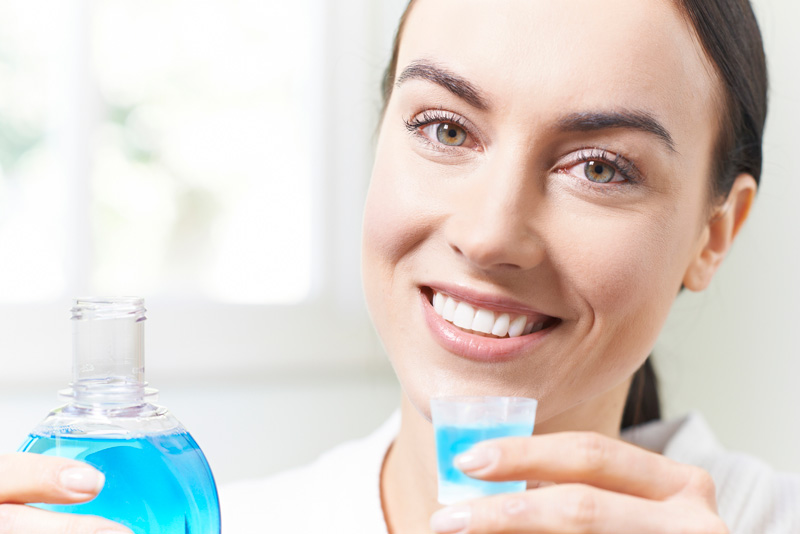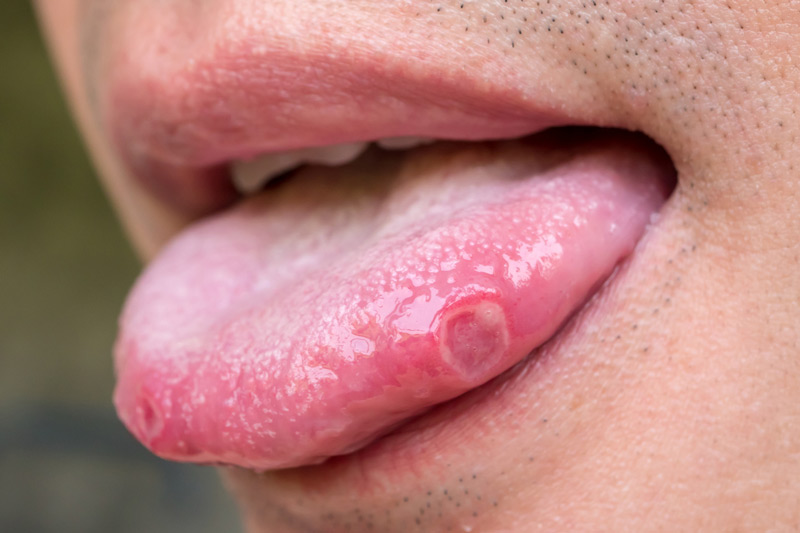The Best Mouthwash for Mouth Sores

Mouth sores and canker sores are normally the results of minor irritation and they should go away by themselves within a couple of weeks. If you find that you are victim to recurring mouth ulcers, or they never seem to go away entirely, then you should see a doctor or dentist to rule out a more serious condition like mouth cancer or a virus.
What Are Mouth Sores?
Mouth sores are small, shallow lesions that manifest themselves on the soft tissues found in your mouth, including:
- Gums
- Cheeks
- Tongue
- The roof of your mouth
- Lips
These unsightly lesions are normally white or yellowish in color and they are often round in shape with a red, inflamed border. A mouth sore is usually no bigger than a pea, but in some cases, they can be larger. There are two categories that mouth sores fall into: Simple and complex. The average person will have around three simple sores per year during young adulthood. Complex sores are less common and tend to occur when you have already had a mouth sore—they also tend to be bigger and more painful. While some mouth sores heal within a few weeks, others can last for up to six weeks—sometimes even longer!
Where Do Mouth Sores Come From?

Acidic/spicy foods: Damages sensitive tissue in your mouth and causes irritation, leading to the formation of a sore. You may also be allergic to some foods, which also contribute to mouth sores.
Trauma and injury: If you have taken a blow to the mouth from sports or falling over then you could end up with a mouth sore. Braces can also cause enough irritation of the surrounding tissues in your mouth to cause a lesion to appear.
Hormones and stress: If you are incredibly stressed out and running yourself into the ground, you could be at risk of canker sores.
Medication: certain medications and aggressive medical treatment like chemotherapy can have an adverse effect on your mouth.
Smoking and drinking: tobacco and alcohol can cause lesions in the mouth and even mouth cancer!
Iron and vitamin deficiencies: if you suffer from anemia or low levels of zinc you will have a greater risk of mouth sores.
Eating disorders: Anorexia and malnutrition are also contributing factors to poor oral health and canker sores.
So, now that we know some of the causes of mouth sores, let’s take a look at how to treat them. There are several over the counter gels and DIY remedies you can use to combat the painful effects of sores in your mouth. One very effective way of speeding up the healing process is to use an antibacterial mouthwash to ensure that you are promoting a healthy environment, which the bacteria cannot feed on. Here are some of the best mouthwashes we have found that will allow you to free yourself from the pain of mouth sores.
Best Mouthwash for Mouth Sores
Salt Water Rinse

Orajel Antiseptic Rinse
Orajel is medically formulated to provide specific relief from mouth sores. It promotes healing by killing bad bacteria and it is also available as an alcohol-free version. It has received very positive reviews during recent years as being one of the most effective remedies for mouth sores and it gets to work almost immediately. So, if you don’t have the time or inclination to make a homemade saline rinse, then this could be the perfect product for you. It is priced affordably and offers excellent value for money.
Colgate Peroxyl
Colgate has formulated a mouth rinse that promotes the healing of mouth sores in a gentle manner. This product is recommended by dental professionals worldwide to safely and effectively provide you with almost instantaneous relief from the irritation you are suffering and it completely alcohol-free. While some rinses do include alcohol for antibacterial purposes, many people find that it actually has an adverse effect on their mouth sores.
Baking Soda Rinse
Baking soda is alkaline, so it works wonders to neutralize the acidic bacteria in your mouth that irritates your mouth sore. It also kills bacteria, meaning it will supercharge the natural healing process. Mix a teaspoon of baking soda in distilled water and swish around your mouth like your life depends on it! The taste can be somewhat funky, so you can follow up with a freshwater rinse afterward if you like.
Final Thoughts
A mouthwash will be even more effective at treating canker sores if you combine it with other products like a medicated gel. You also need to take a look at some of the criteria listed above that are likely to cause mouth sores, so you can inform yourself on any necessary changes to your diet or lifestyle habits that you need to adjust to prevent them returning. If you are concerned about the time it is taking for your sore to heal, or they seem to return no matter what you do, then put your mind at rest by scheduling an appointment with your dental hygienist or dentist.
Relate Posts to Read:
Best Mouthwash for Sensitive Teeth and At-Home Remedies
